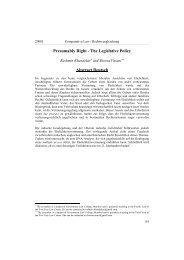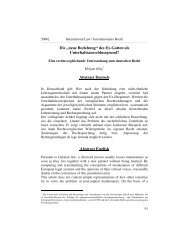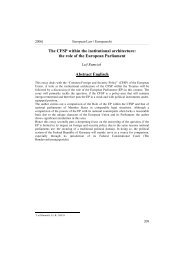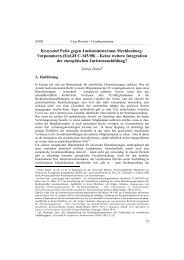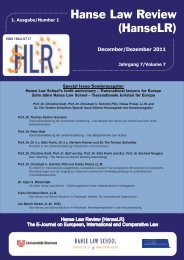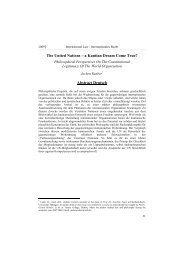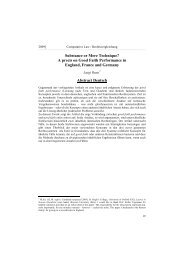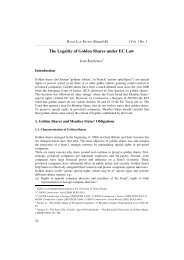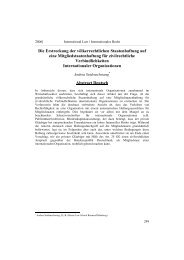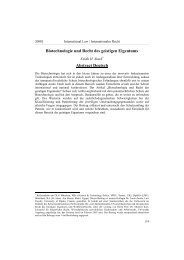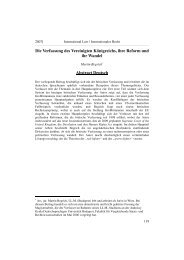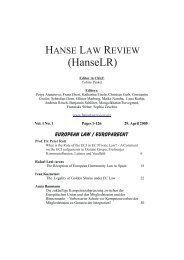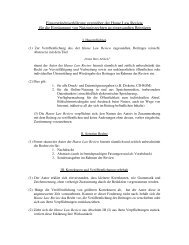The United Nations – a Kantian Dream Come True? - Hanse Law ...
The United Nations – a Kantian Dream Come True? - Hanse Law ...
The United Nations – a Kantian Dream Come True? - Hanse Law ...
Create successful ePaper yourself
Turn your PDF publications into a flip-book with our unique Google optimized e-Paper software.
2009] International <strong>Law</strong> / Internationales Recht<br />
___________________________________________________________________________________________________________________________________________________<br />
states ‘must renounce their savage and lawless freedom, adapt themselves to public<br />
coercive laws, and thus form an international state (civitas gentium)’. 129 Nevertheless,<br />
Kant’s concluding remarks opt <strong>–</strong> in conformity with his introductory thesis <strong>–</strong> for the<br />
establishment of a mere league of free nations. He might not consider it to be the best, but<br />
the best possible solution.<br />
b) Beyond a Free Federation <strong>–</strong> What Kant Should Have Said<br />
Kant’s argument for this free federation is based on an analogy. He transfers the model of<br />
the state of nature to a second level:<br />
Peoples who have grouped themselves into nation states may be judged in the same way<br />
as individual men living in a state of nature, independent of external laws; for they are<br />
standing offence to one another by the very fact that they are neighbours. Each nation, for<br />
the sake of its own security can and ought to demand of the others that they should enter<br />
along with it into a constitution, similar to the civil one, within which the rights of each<br />
could be secured. 130<br />
Just like individuals escape the war-like, freedom-threatening state of nature by the<br />
conclusion of a contractus originarius, states have <strong>–</strong> for the sake of their own security <strong>–</strong> a<br />
moral duty to enter a legal state, again, as on the first level, based on a compact. Since<br />
according to the first definitive article the civil constitution has to be republican on the first<br />
level between individuals, an analogously built inter-state constitution would have to<br />
comply with this criterion, too. <strong>The</strong> logical conclusion of Kant’s moral reasoning would be<br />
the postulation of a republic of states, a republic of republics <strong>–</strong> an argument which Kant<br />
certainly was aware of when he honours the world republic as the positive idea, which<br />
unfortunately does not prevail. He rejects a global republican state in favour of the negative<br />
substitute: the federation of free states, the league of nations. However, the justification<br />
Kant offers for his deviation from the ‘positive idea’ turns out to be rather un<strong>Kantian</strong>. His<br />
arguments are inconclusive and the question for what he has in fact said might better be<br />
followed by the question what he should have said. 131<br />
His first and central argument for the rejection of a state of peoples 132 is a supposedly<br />
conceptual self-contradiction. For in a state of peoples all confederated states would<br />
become one single nation, the contradiction in terms is supposed to consist in the fact that a<br />
merger of all nations into a single state would overlook the initial intention to establish a<br />
law of peoples, a law governing the relations between different nations. 133 Individually<br />
considered, this is a rather weak argument, since the initial intention might well be<br />
mistaken. Habermas suggests it is not and explains that the inconsistency Kant tries to point<br />
at follows from the fact that the citizens of a world republic would have to give up the<br />
substantial freedoms they already enjoy as members of a nation state <strong>–</strong> namely, inter alia,<br />
129 Ibid.<br />
130 Ibid., 102.<br />
131 See Carson, Thomas, ‘Perpetual Peace: What Kant should have said’, [1988] 14 Social <strong>The</strong>ory and Practice<br />
173 and Marini, Giuliano, ‘Kant’s Idea of a World Republic’, in Byrd, S. and Hruschka, J. (eds), Kant and <strong>Law</strong><br />
(Ashgate, Aldershot, 2006), 369, 372-375.<br />
132 Nisbet at Kant, ‘Perpetual Peace’, 102 unfortunately translates the German Völkerstaat in this passage with<br />
international state which rather supports the idea of the absence of statelihood on a national level. <strong>The</strong> German<br />
Völkerstaat however leaves room for the domestic peoples to form states.<br />
133 Kant, ‘Perpetual Peace’, 102.<br />
65



